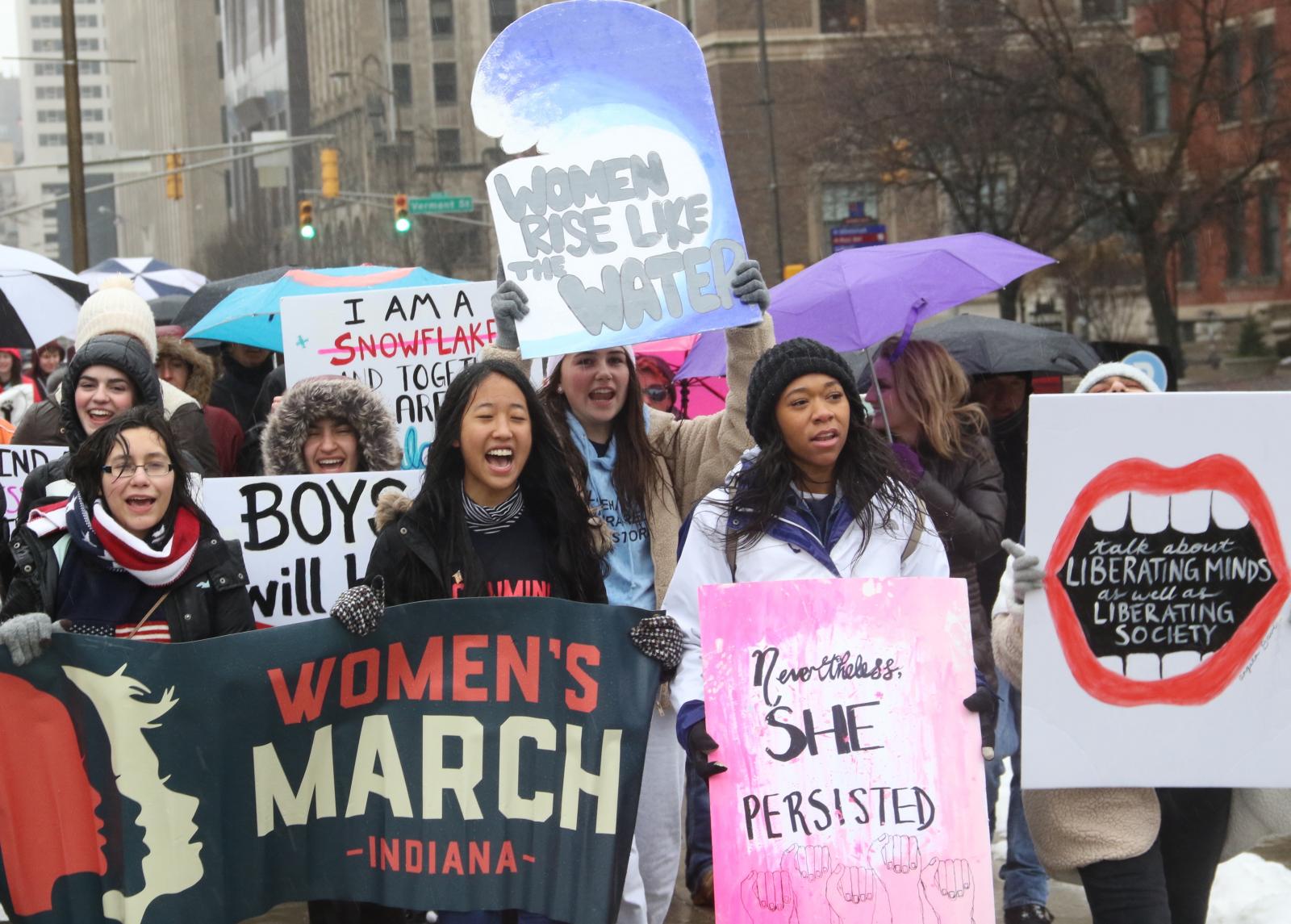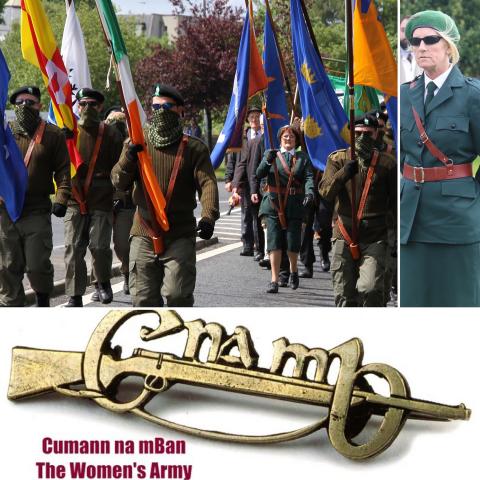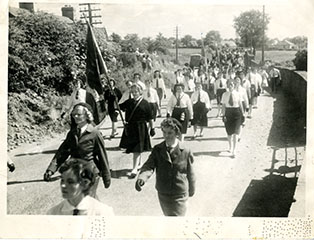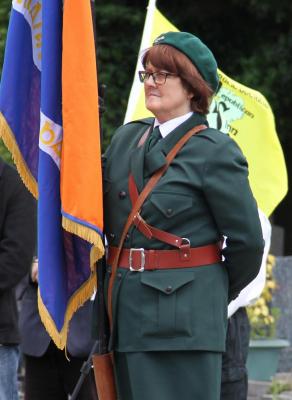

photos by Robert White, used under CC BY
Although women and men are comrades in many social movements, the participation of women is often marginalized. Cumann na mBan, an exclusively female organization, was and is a unique response by Irish women to their marginalization in the Irish Republican Movement. Cumann na mBan: The Women’s Army (2019), is a 66 minute documentary on the only exclusively female social movement organization in the world that endorses and engages in armed struggle —they are, in the eyes of the authorities, women “terrorists”.

This documentary is open access and available both with captions and without captions on IU's Kaltura platform. Presented below is the captioned version.
Cumann na mBan/The Irish Women’s Council was established on April 2, 1914, because progressive women —including suffragettes, trade union activists, and socialists — were excluded from the all-male Irish National Volunteers. Although historians of the Irish independence era tend to focus on the activities of the Irish Republican Army (IRA) and the political party Sinn Féin, the contributions of Cumann na mBan activists are well-documented. Cumann na mBan, an independent organization of the Irish Republican Movement, was actively involved in the 1916 Easter Rising, the Irish War of Independence (1919-22), and the Irish Civil War (1922-23), and at least nine members were killed in these years.

Since the 1920s, Cumann na mBan and its activists have received little attention. Yet, the organization actively supported military campaigns in the 1940s and 1950s by the (then all-male) Irish Republican Army (IRA). And ten Cumann na mBan volunteers were killed during the more recent “Irish Troubles” (1969-1998). The most prominent of these women was Maire Drumm, who in addition to being a Cumann na mBan volunteer was Vice- President (1972-76) and Acting President of Sinn Féin (1973). Today, and because of political differences, Sinn Féin claims that Cumann na mBan ceased to exist in the late 1980s. In fact, the women of Cumann na mBan persist — the organization is proscribed in Northern Ireland and Great Britain and its members are counted among “dissident” Irish Republicans who continue to endorse the use of armed struggle in pursuit of an all-Ireland republic (see for example, https://www.gov.uk/government/publications/proscribed-terror-groups-or-organisations--2).
In addition to offering insight on the marginalization of women in social movements, Cumann na mBan: The Women’s Army offers information on fundamental topics like recruitment, commitment and solidarity, collective identity, and the persistence of social movement organizations in “lean years”. Included are interviews with Mary Ward, who served as President of Cumann na mBan in the late 1970s, Margaret Walsh, who has been described as “the best intelligence officer the Republican Movement had” (see page 10, https://iuidigital.contentdm.oclc.org/cdm/compoundobject/collection/IrishNews/id/6756/rec/3), and Peig King, who served as O/C (Commanding Officer) of the Dublin unit in the 1970s. These interviews are complemented by historical photos, archival video, and contemporary information.

Additional Resources:
Although it is not a comprehensive list, the following sources offer information on the women’s movement, the participation of women in social movements, Cumann na mBan, and the Irish Republican Movement:
Alison, Miranda. 2010. Women and Political Violence. London: Routledge.
Banerjee, Sikata. 2012. Muscular Nationalism: Gender, Violence, and Empire in India and Ireland, 1914-2004. New York: NYU Press.
Bell, J. Bowyer. 1979. The Secret Army: The IRA 1916 — . Dublin: Irish Academy Press.
Bloom, Mia, Paul Gill and John Horgan. 2012. “Tiocfaifh ar mna: Women in the Provisional Irish Republican Army”. Behavioral Sciences of Terror and Political Aggression 4/1: 60-76.
English, Richard. 2003. Armed Struggle. Oxford: Oxford University Press.
Friedan, Betty. 1963/2001. The Feminine Mystique. New York: Norton.
Gillis, Liz. 2014. Women of the Irish Revolution. Cork: Mercier Press.
Hanley, Brian and Scott Millar. 2010. The Lost Revolution: The Story of the Official IRA and the Workers’ Party. London: Penguin.
McAdam, Doug. 1990. Freedom Summer. Oxford: Oxford University Press.
McCammon, Holly, Verta Taylor, Jo Reger, and Rachel Einwohner. 2016. Oxford Handbook of U.S. Women’s Social Movement Activism. Oxford: Oxford University Press.
McCarthy, Cal. 2007. Cumann na mBan and the Irish Revolution. Cork: Collins Press.
McGlinchey, Marisa. 2019. Unfinished Business: The Politics of “Dissident” Irish Republicanism. Manchester: Manchester University Press.
Moloney, Ed. 2007 (2002). A Secret History of the IRA. 2d edition. London: Penguin.
Naughton, Lindie. 2016. Markievicz: A Most Outrageous Rebel. Dublin: Irish Academic Press.
Ní Chathmhaoil, Líta and Dieter Reinsich. 2014. Cumann na mBan: 100 Years of Defending the Republic. Dublin: Cló Saoirse — Irish Freedom Press.
O’Keefe, Theresa. 2013. Feminist Identity Development and Activism in Revolutionary Movements. New York: palgrave macmillan.
Reinisch, Dieter. 2016. “Cumann na mBan & Women in Irish Republican Paramilitary Organisations, 1969-1986”. Estudios Irlandeses 11: 149-62.
“Remembering the Past”. An Phoblacht/Republican News, 1 April 1993, p. 13.
Taylor, Verta. 1989. “Social movement continuity: The women’s movement in abeyance.” American Sociological Review 54: 761-75.
Viterna, Joyce. 2013. Women in War: The Micro-Processes of Mobilization in El Salvador. Oxford: Oxford University Press.
Ward, Margaret. 1983. Unmanageable Revolutionaries: Women and Irish Nationalism. London: Pluto Press.
Whittier, Nancy. 1995. Feminist Generations: The Persistence of the Radical Women’s Movement. Philadelphia: Temple University Press.
White, Robert W. 2017. Out of the Ashes: An Oral History of the Provisional Irish Republican Movement. Newbridge, Co. Kildare: Merrion Press.
